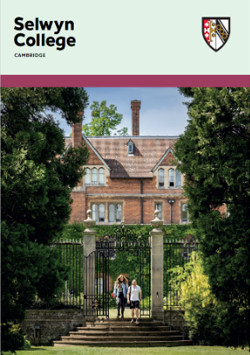The subject at Selwyn
There are usually between seven and nine undergraduate law students per year. Selwyn has a thriving College Law Society, run by the students, which arranges talks and webinars with significant figures in the legal profession, social functions, mooting competitions, talks and visits from legal practitioners, and regular dinners. It also enjoys the distinct advantage of being the nearest College to the Law Faculty Building, which houses the University Law Library and the Law lecture rooms. In addition, the Selwyn Library has a pleasant and well-equipped Law area of its own, containing most of the law reports, journals and books which undergraduate law students need to consult. Selwyn is happy for its students to spend a year in a European University on the Law Exchange scheme (formerly Erasmus) and willingly accommodates their exchange partners from Europe amongst its students.
The Teaching Fellows
Selwyn has three Law Fellows and can therefore provide supervisions in many subjects ‘in house’.
Professor Janet O'Sullivan is a Professor of Private Law in the Faculty of Law, University of Cambridge. She lectures in the Law of Tort, Contract and in Aspects of Obligations, and supervises Tort and Contract for the Selwyn students, fields in which she pursues research. She has been awarded the prestigious Pilkington University Teaching Prize. Before joining Selwyn in 1994, she was in practice in a large commercial firm of solicitors in the City of London and retains links with the City, which prove useful to students in planning work experience and making career choices.
Mrs Sarah Fraser Butlin KC is the David K P Li Fellow in Law. She teaches Labour law and Criminal law. Her research work focuses on Labour law and on socio-legal work exploring the position of EU migrant workers in the UK. She is also a practising barrister at Cloisters Chambers, London, and became a KC in 2024.
Dr Ernesto Vargas Weil joined the college as the Spencer-Fairest Teaching Fellow in Law in October 2022. His main interest is in property theory and comparative law, and he is currently researching on legal change in property law. At Selwyn he teaches Land Law and Equity.
Qualities we are looking for
Law at Cambridge is an intensely academic, intellectually demanding subject and only candidates of the highest academic calibre are suited to it. We are looking for candidates who are very bright, academic and hard-working, with a strong interest in and enthusiasm for the Law. In particular, we are looking for those who can follow and analyse arguments, with an ability to apply or distinguish principles and use language precisely; in short, someone who has the sharpness, focus and interest to ‘think like a lawyer’. It is essential that students have an intellectual engagement with the subject.
We prefer that candidates have chosen three A-Levels (or equivalent) from the recommended courses for Arts and Social Sciences applicants, listed in The Subject Matters.
Interviews
Selwyn Law candidates have a general interview and either one or two subject interviews. In order to test the qualities mentioned in the previous section, in the subject interview(s) we ask candidates to read a short legal text beforehand. In this interview, the candidate is asked questions on the text and the issues it raises are explored, to test comprehension, analytical skills, precision of thought and language, and intellectual sophistication. Then, further questions are asked, perhaps concerning a topical or controversial legal, political or ethical issue. In all of this, it is important to stress that no prior legal knowledge is required or expected. All these issues may be covered in one interview, but in some years they may be divided between two, shorter, subject interviews.
You will also have a shorter general interview. This is intended to let us find out more about your motivation in applying for Law at Cambridge. It is intended to give us a fuller sense of your aptitude for your chosen course, the maturity of your approach towards academic work, and your other interests outside Law.
Admissions Assessment - LNAT
All applicants for Law are required to take the National Admissions Test for Law (LNAT). The LNAT has earlier registration deadlines and different arrangements than other Cambridge admissions assessments. Full details can be found on the LNAT website.
March 2025


